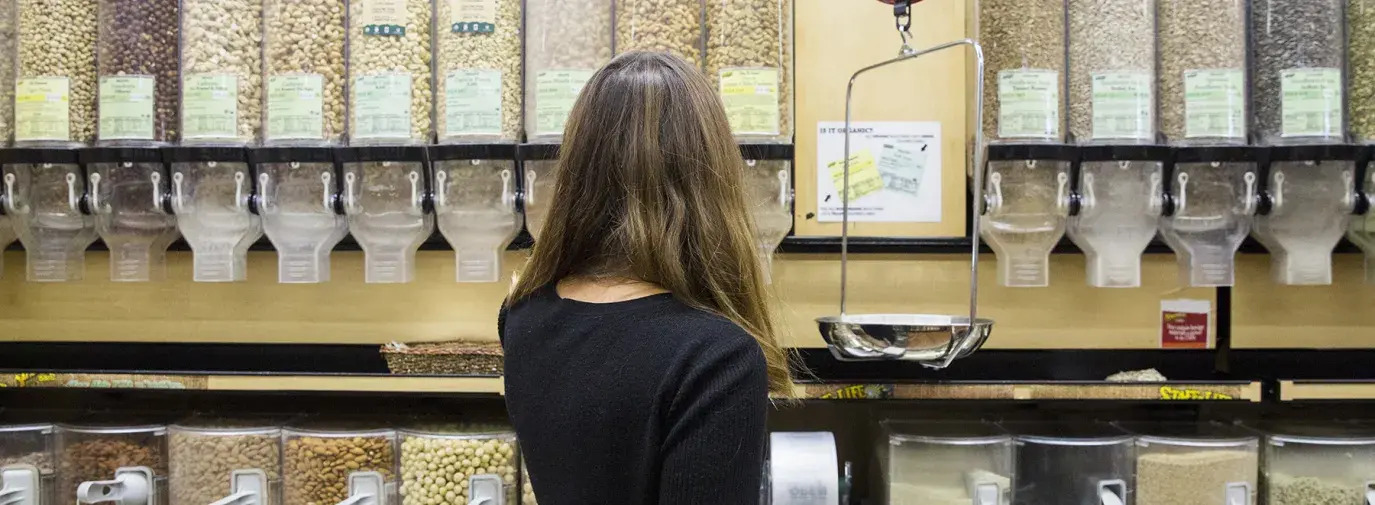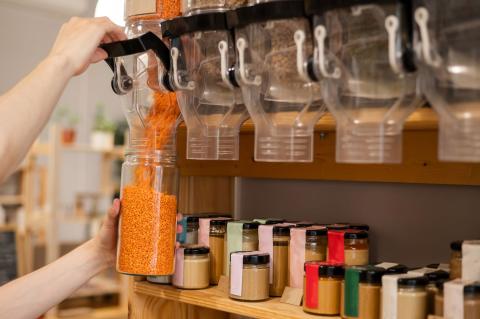
Buying household essentials individually can add up fast—in packaging waste and actual dollar cost. Yet according to a study from Portland State University’s Food Leadership Center, shoppers can save an average of 56% by purchasing natural and organic foods in the bulk foods aisle of a grocery store. Bulk buying is exactly what it sounds like—instead of purchasing items like hand soap, rice, coffee, and other household essentials in small, individual containers, bulk buying means purchasing a lot all at once. Some grocery stores offer bulk aisles, where shoppers can fill a bag and pay based on weight, or a store can be entirely dedicated to bulk shopping. Whether you’re looking to cut costs or reduce your own packaging waste, review our key tips to maximize your bulk-buying benefits.
Get the most bang for your buck
The key to being a bulk aficionado is having a solid plan! Before heading to the store, take inventory of what your household regularly uses. Non-perishables are the way to go. Fruits, vegetables, and dairy products aren’t the only items that may spoil: spices and oils are a few products with surprisingly quick expiration timelines. Consider what items you could purchase in bulk that could refill existing containers—hand soap is a common example. Keep this list handy and reference it often.
Stay intentional
Once you are at the store, being intentional about your purchases is key. The many deals offered by bulk sellers can be tempting—overconsumption is a frequent pitfall of buying in bulk. Whether you visit the bulk aisle of your local grocer or a wholesale co-op, sticking to your list will save you from unnecessary purchases.
Save by calculating cost-per-unit
A 50-pound sack of rice will cost more than a 16-ounce bag, so check the price tag for unit cost. If this measurement isn’t available, use your calculator to divide the total price by the number of units–for example $22 for 50 pounds of rice would be $0.44 per pound. If it’s cheaper than your regular purchase, you’re saving.
Additionally, bulk products typically last a long time—so if you stick to your list, you’ll save money in the long term and use less packaging. You can also dedicate some time to couponing; an extra 5% off can go a long way.

Curb the packaging waste
Some stores allow you to bring your own container for bulk purchases, such as filling a reusable produce bag with your favorite dried fruit. Of the packaging you do have to purchase, make the most of it by reusing—such as a large plastic bag to line a trash bin or big boxes that can double as crafting materials.
Share the goods
Prior to picking up that pallet of garbanzo beans, make sure that you will use it all! If some might go to waste, reach out to friends to split bulk purchases. Green America staff have long shared bulk-buying from Frontier Co-op {GBN}, and go in on monthly orders together that get shipped to the office and split up.
Buy green in bulk
Just because bulk is cheaper doesn’t always mean it’s better. A gallon of laundry detergent may be cheaper at a bulk store, but if it contains toxic ingredients, then it’s just a bargain sale on chemicals. We recommend purchasing from local wholesale co-ops, the bulk aisle of green grocers, and asking sustainable businesses if they sell in bulk.
Green Business Network® has a page dedicated to bulk food vendors that have achieved Green America’s Green Business Certification; these vendors are great places to find organic, non-GMO, and Fair-Trade food items. Here are a few of our favorites:
- GloryBee Foods Inc : GloryBee is a family-owned bulk food distributor dedicated to providing high-quality organic ingredients to its customers. It also offers beekeeping and hygiene products alongside a selection of groceries.
- Numi Tea : This Bay Area-based company produces premium quality organic teas and fresh herbs, which you can buy in bulk if you’re a big tea-drinker. Their blends are created with only 100% real fruits, flowers, and spices, and the Numi team travels around the world to source their organic ingredients and build partnerships with farmers.
- SunRidge Farms : This purveyor of snacks was founded during the organic movement of the 1970s. What was once a small family business and has grown to offer a selection of almost 1,000 products in bulk. “Our bulk shopping mantra relates to [being] earth-friendly, with less packaging to help our planet and a reduced carbon footprint,” says Greg Koenig, SunRidge Farms’ director of e-commerce. Its inventory includes trail mixes, seeds, dried fruits, granolas, grains, and beans.
Tip: If you have your own containers to refill in the bulk section, be sure to weigh them empty and label them with the weight. Then you can reuse them over and over, and not pay for the weight of the container itself.
Buying in bulk may not always be the best option for you or your household, but consider your shopping habits and long-term needs to decide where it can be a helpful green hack.







